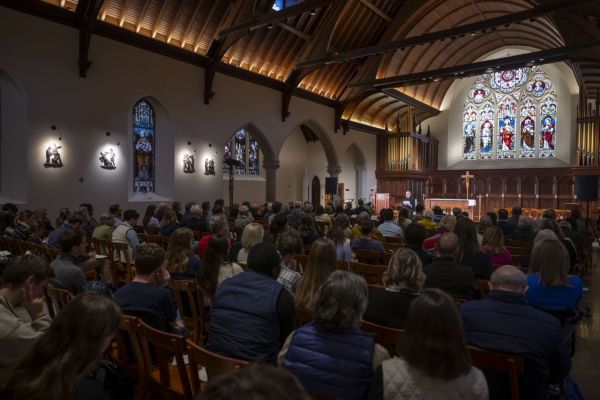Georgetown University’s Office of Mission & Ministry, which promotes Georgetown’s Catholic and Jesuit heritage, celebrated Jesuit Heritage Month this November with a slate of events celebrating the contributions of Jesuits to the university and the world, focusing on the Jesuit ethos of social justice.
The month featured events honoring Jesuit contributions to the arts, social justice and Georgetown’s campus community. In addition to large public gatherings, including a lecture by former university president Leo J. O’Donovan, S.J., Mission & Ministry offered a series of student-focused fireside chats with Jesuits and a trivia night in the Hilltop Tap Room.
The annual celebration occurred as a result of a student-led initiative for a Jesuit Heritage Week in 2000 and grew into a month-long program in 2017. It takes place in November in remembrance of the 1989 murder of six Jesuits and two women working at a Jesuit university in El Salvador.

Fr. Mark Bosco, S.J., the Vice President for Mission & Ministry, said his office featured social justice in the programming for the month, highlighting an event that featured peacemakers working in Ukraine, Sudan and the Middle East as part of the Dahlgren Dialogue, an annual event hosted in Dahlgren Chapel.
“We want to make sure that we do something around social justice in memory of those who were slain,” Bosco told The Hoya. “There’s always a component of ‘Faith that Does Justice’ that we try to make alive by bringing in some really qualified people to talk about what that means.”
“I learned a lot about the peacemakers in those troubled areas and the great stress of not only people who are under siege but also how stressful it is to be a peacemaker and try to take care of those people,” Bosco added.
Fr. Peter Folan, S.J., a Georgetown theology professor, said the presence of the Jesuit community makes Georgetown a unique place, keeping it connected to its history and foundational values.
“I hope that the community presence is kind of a living embodiment of the Jesuit tradition, the tradition that was quite literally at the foundation of this university and one that still animates it today,” Folan told The Hoya. “Fundamentally, the Jesuit community is animating and being a living witness to that dimension of Georgetown’s reality, historically, in the present and I certainly hope into the future.”
“It’s not just an add-on at Georgetown; it’s one of the things that really makes us distinct,” Folan added.
Georgetown’s Jesuit community currently has 46 members and is based in Wolfington Hall, the Jesuit Residence adjacent to the Southwest Quad residence halls. In addition to roles as professors and university administrators, Georgetown Jesuits also serve in local parishes, at the MedStar Georgetown University Hospital and at the now-unaffiliated Georgetown Preparatory School in North Bethesda, Md.
Fr. William Campbell, S.J., the rector of the Georgetown Jesuits, said he felt it was important that the Jesuit community was visible and active throughout the month, including at a large opening Mass in Gaston Hall.
“I was very aware of the sense of community that I shared with my Jesuit brothers,” Campbell told The Hoya. “I’ve learned that this year had the highest turnout for Jesuits to be there and I think there’s such wonderful value for the Georgetown community to see us celebrating in common. A lot of students might know one or two Jesuits, but to see us as a corporate identity, I think that’s a wonderful thing to witness for the students here.”
Rachel Ezrielev (CAS ’28), who attended the Jesuit trivia night, said she enjoyed the opportunity to learn about Jesuit presence in the media and pop culture.
“It was a very fun and warm space where I could enjoy Jesuit trivia with my friends,” Ezrielev told The Hoya. “Some of the questions were a little niche for me as a non-Catholic, but I still had a good time. I learned some fun facts about Jesuit history and Jesuit appearances in pop culture and movies, and it helped me understand more deeply the Jesuit impact on culture.”
Folan said that he was pleased by the level of student interest in engaging with the Jesuits and Jesuit heritage more broadly.
“It’s a nice opportunity, I hope, for the students to learn something about the Jesuits,” Folan said. “For the Jesuits, it’s also exciting, and it’s a boost to know that people care about what we’re up to, who we are and something about our history and present. Many of them are so desirous to be part of our future as well.”